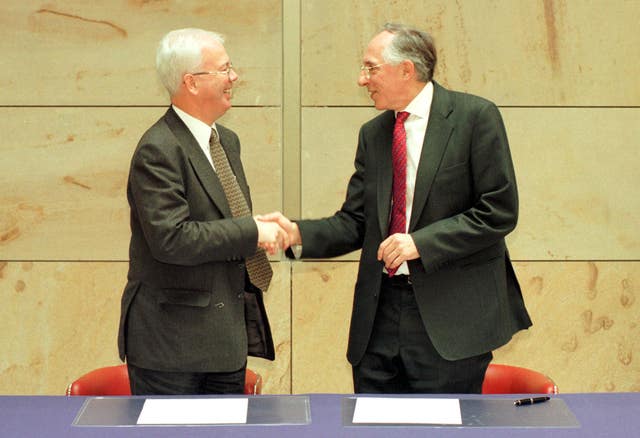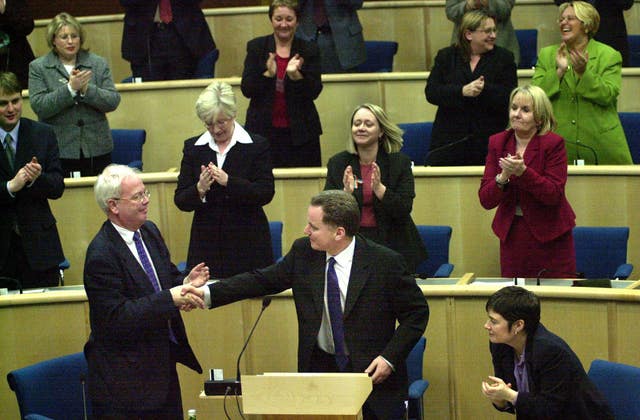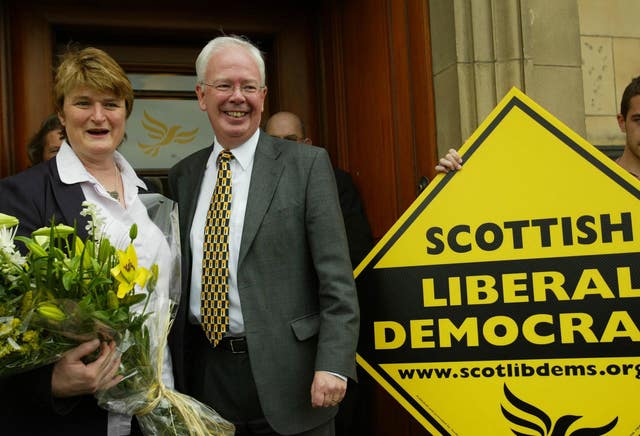
Death and scandal in the first Scottish Parliament saw Jim Wallace step up to act as first minister, but two decades on he has revealed how close the coalition government came to not happening at all.
Before the party became kingmakers in David Cameron’s government at Westminster, the Scottish Liberal Democrats shared power with Labour after the birth of devolution, with Mr Wallace serving as deputy first minister until 2005.
Reflecting on 20 years of Scotland’s devolved parliament, Mr Wallace said: “Devolution and the dream of a separate Scottish parliament was one thing that brought me into the Scottish Liberals at university.
“It was very exciting to be there to see it become reality,” he said, adding that two decades on he has “no doubt that Scotland is a better place because of the parliament”.
But before backlash over tuition fees caused such damage to the Liberal Democrats’ reputation, the issue nearly stopped them entering power in Scotland nearly a decade earlier.
With the additional member system used to elect the parliament’s 129 MSPs raising the chances of a hung parliament, during the 1999 campaign the Scottish Lib Dems had pledged to speak with whichever party won the most seats.
But Mr Wallace revealed that disagreements over tuition fees almost ended coalition talks, describing it as the “biggest sticking point” between Labour and the Lib Dems.
“There was at least more than one occasion during the negotiations that I walked away from them because I didn’t think we could reach agreement.”
However, his “sense of obligation”, having campaigned for the creation of the parliament and proportional representation, saw talks resume.
“I always came back to the table to see if we could find an agreement, not least on university tuition fees.”

The scrapping of tuition fees was a key plank of the manifesto, and it was agreed that the cabinet would “put a box around it”, suspending collective responsibility on the topic, with the government eventually agreeing to abolish up-front fees for students in 2001.
Nick Clegg, campaigning in the 2010 general election, turned to Mr Wallace for advice about how to form and govern in coalition, with tuition fees a key discussion point.
Mr Wallace said: “From our experiences, we knew that to have a detailed programme of government that the parties agreed on was important, and the coalition in 2010 did that.
“There were other things taken on board – we actually carved out tuition fees in the UK, but somehow they didn’t quite get the right answer there like we did in Scotland.”
The shock death of Donald Dewar after a year in power resulted in Mr Wallace being asked to become acting first minister, and he said it was a “day I’ll never forget”.
“It was just absolutely tragic, I was completely gutted.
“I was in St Andrew’s House when I heard about the fall and him being taken into hospital. Then we just had to wait. It was awful.”
Although he had previously stepped in to lead the government briefly while Mr Dewar had surgery, Mr Wallace said: “It wasn’t a foregone conclusion that I would become first minister when Donald died, but the Labour members of the cabinet asked me if I would, and so I was formally appointed by the presiding officer until such time as parliament elected a new first minister.”

It was a role he would take up for a second time when, engulfed in the Officegate scandal, Mr Dewar’s successor Henry McLeish resigned.
“In retrospect it was probably inevitable but it played out in slow motion,” Mr Wallace said of the decision amid allegations that Mr McLeish had failed to declare on his expenses that he had sublet part of his constituency office.
“But on a personal level I worked closely with Henry and seeing someone in that situation wasn’t exactly pleasant.
“I think he made the right choice because it would have just distracted from everything else that was going on but again the coalition got through it.”
As for the way his own leadership ended, Mr Wallace was pleased he could step down on a high, following the Liberal Democrats’ good showing in the general election in 2005 and with the party still bigger than the SNP in the Scottish Parliament.
“We were the second party both in terms of votes and in terms of seats which was a very satisfying point at which to go,” he said.
“I remember saying at the time I wanted to go when people were saying ‘why are you going?’ rather than ‘when are you going?’”

The lifelong Liberal expressed sadness at the party’s slide from an influential, government-forming force in Scottish and UK politics to having the smallest number of MSPs of any party in the current Scottish Parliament.
“The Liberal Democrats are now struggling to be heard and we need reinvigorating”, he admitted, but pointed to the rise of the SNP and the surprising decline of Labour in Scotland to show that “politics is fluid, now more than ever, and I think that we’ve got to up our game there and show that we’ve got an exciting agenda and don’t get bogged down in constitutional issues”.
“People are still interested in how their hospitals are run and whether their kids or grandkids are getting a decent education.”


Why are you making commenting on The National only available to subscribers?
We know there are thousands of National readers who want to debate, argue and go back and forth in the comments section of our stories. We’ve got the most informed readers in Scotland, asking each other the big questions about the future of our country.
Unfortunately, though, these important debates are being spoiled by a vocal minority of trolls who aren’t really interested in the issues, try to derail the conversations, register under fake names, and post vile abuse.
So that’s why we’ve decided to make the ability to comment only available to our paying subscribers. That way, all the trolls who post abuse on our website will have to pay if they want to join the debate – and risk a permanent ban from the account that they subscribe with.
The conversation will go back to what it should be about – people who care passionately about the issues, but disagree constructively on what we should do about them. Let’s get that debate started!
Callum Baird, Editor of The National
Comments: Our rules
We want our comments to be a lively and valuable part of our community - a place where readers can debate and engage with the most important local issues. The ability to comment on our stories is a privilege, not a right, however, and that privilege may be withdrawn if it is abused or misused.
Please report any comments that break our rules.
Read the rules here